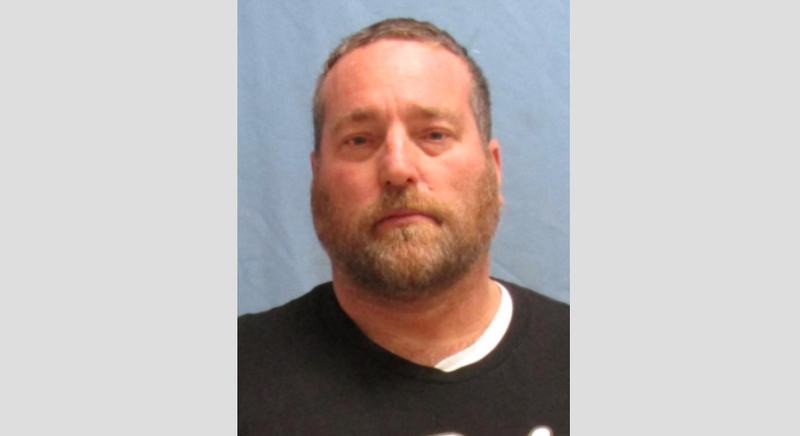Former Arkansas County auxiliary sheriff's deputy David Chastain was convicted Tuesday by a federal jury of three charges accusing him of pressuring a confidential informant in late 2017 to steal an all-terrain vehicle and obtain stolen guns for him.
The 48-year-old law enforcement veteran, who had previously been a full-time deputy and a state trooper, was working at the time as an unpaid deputy to help out the Arkansas County sheriff's office.
He was arrested minutes after he met the informant, Michael "Chase" Caldwell, in a parking lot of a Stuttgart convention center on Dec. 19, 2017, and paid Caldwell $300 for three guns that Caldwell told him someone had stolen, according to testimony in a two-day trial. Chastain didn't know, but the FBI was watching and listening.
Caldwell testified Monday, the first day of the trial, that he contacted the FBI and helped agents zero in on Chastain after Chastain, for whom he had often worked as a confidential source, suddenly began asking him to obtain stolen goods for him personally.
Caldwell said he initially agreed to do what Chastain asked, in return for any favors Chastain could provide on charges he had pending in Arkansas County Circuit Court, but then he became worried that he wasn't going to get proper credit in the pending cases.
In an audio recording made by the FBI at the time of Chastain's arrest and played for jurors Tuesday morning, agent Aaron Green asked Chastain if he knew why he was under arrest.
Chastain said he probably knew why the FBI thought he had done something wrong, but that his stealthy doings were simply misunderstood.
"I was on my way to the police department to go run them," he said, referring to checking the guns' status at the Stuttgart Police Department to see if they were stolen. He acknowledged, "I've been buying stolen stuff," but said it was all done as part of his investigation.
Green told Chastain that he didn't buy the story, nor did he believe that Chastain was merely investigating when he paid the informant $1,000 for the stolen all-terrain vehicle that a Memphis man had bought for $25,000 three years earlier, and that area law enforcement officers were looking for while Chastain kept it hidden in his shop.
"Do you normally keep evidence at your house?" Green asked.
Chastain replied, "Well, if we gave it back to the guy, he couldn't keep his mouth shut."
Chastain also told the FBI agent, "You can call the prosecutor. I got the money from him" to buy the guns. "And I used buy money from the Tri-County Task Force to buy that Ranger" ATV.
Green was the government's last witness in the case. The defense then presented three witnesses -- a gun expert and two law enforcement officers who said they also used Caldwell as an informant. But Chastain himself didn't testify.
He was charged with interfering with commerce by means of extortion, attempted interference with commerce by means of extortion and receipt of a firearm with intent to commit a felony -- specifically, possession of a stolen firearm.
In closing arguments, defense attorney Molly Sullivan told jurors that even if Chastain bought the ATV with the intention of keeping it, "This was a side deal, a personal deal," and didn't involve him using his authority over the informant to force the informant to commit a crime.
Sullivan noted that Caldwell had offered in a text message he sent to Chastain, and later shared with the FBI, that Chastain didn't need to sell anything to obtain an ATV because he could get "a brand new one for $1,000."
Caldwell was responding to a text from Chastain saying he would be interested in buying one if the informant "came across one."
That, Sullivan said, showed that Caldwell wasn't "induced" to steal anything. Inducement, under color of official right, is an element of the extortion charge.
Sullivan also reminded jurors that Caldwell and his girlfriend, who was also an informant for Chastain, were paid $2,000 apiece by the FBI for helping nab Chastain.
Assistant U.S. Attorney John Ray White, who prosecuted the case with Assistant U.S. Attorney Benecia Moore, told jurors to remember another remark that Chastain made during the recorded conversation with Green: "There's one thing I've done wrong in my life, and that's getting that Ranger."
He also told Green that after the Monroe County sheriff called him to pressure his informant to find out who stole the Ranger, "I told him maybe we should just drop this off in the woods."
White encouraged jurors to use common sense, saying, "What criminal would steal an ATV to sell it to the police, unless the officer was involved on the front end?"
He also told jurors that there was plenty of evidence indicating that Chastain used his authority to induce Caldwell to supply him with stolen goods. Among them, he pointed out, were Chastain's text messages assuring Caldwell that if he was stopped by police while engaged in illegal behavior, "just say you're working for me."
A state trooper testified Monday that he had pulled Caldwell over and then saw him throw a methamphetamine pipe out the window, and Caldwell had insisted that he was working for Chastain. The trooper said he then called Chastain, who assured him Caldwell was operating in an undercover capacity.
In text messages that jurors saw, Chastain reminded Caldwell of the stop by the trooper and said that from now on, "Let me know beforehand" where and how he planned to commit a crime, and to carry out the crime on foot while Chastain was nearby in his patrol car, so he could protect him.
"I don't mean to put you in a bind, but I'm trying to keep you out of the big house," Chastain said in another text to Caldwell, adding that every time he talked to the local prosecutor and judge, "I tell them you're working for me."
Metro on 02/13/2019
